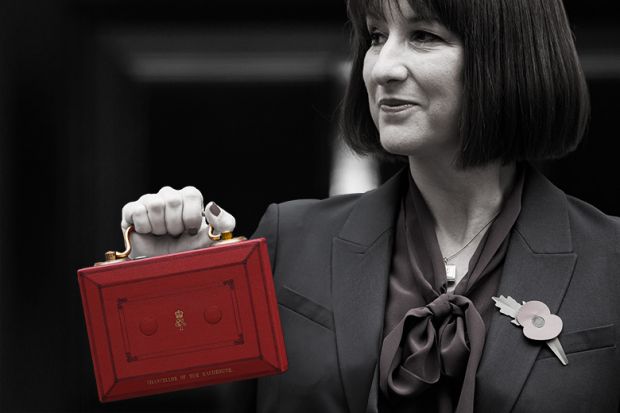The Westminster government’s refusal to put significantly more public funding into England’s higher education system has left universities looking for smaller wins from the coming multi-year spending review, in the hope that any reforms can begin to sow the seeds for more fundamental change.
Skills minister Jacqui Smith ruled out a “large injection of public money” into universities in a speech last week, disappointing those hoping for the state to fill more of the gaps in income caused by the erosion of the value of tuition fees after an eight-year freeze.
Universities should not expect much in the way of additional government grant funding because of the country’s fiscal situation and many competing priorities going into the review – now not due to conclude until June – said Kate Ogden, a senior research economist at the Institute for Fiscal Studies who specialises in higher education.
Her co-authored recent report on education spending for the IFS pointed out that the chancellor Rachel Reeves’ new fiscal rules made higher loans a more appealing way for the Treasury to get more support into universities, and Smith has left the door open for further fee rises following the one due in the autumn.
A commitment to index fees to inflation for the rest of the parliament was now the “best outcome” universities can hope for in the review, said Jonathan Simons, head of the education practice at consultancy Public First.
“It is not unreasonable, given where government is and the state of public finances to say: ‘We’ll keep you where you are in real terms for three years whilst we think about what a new medium-term system might be,’” he said.
This would, said Simons, who was formerly head of education in the prime minister’s strategy unit, give institutions a bit more security.
“At the moment universities are largely planning based on speculation about what future income might look like,” he said.
“If you had three-year visibility, it might allow you to do something a little bit different – and have a different conversation with your lenders.”
Even in this best-case scenario, said Simons, “almost every” institution will have to continue with their “transformation”, including looking at things such as research spend, staff-student ratios and further job cuts.
It was also unlikely to be a sustainable model long term, particularly as future fee rises will take the figure closer to what he called a “psychological barrier” of £10,000 a year and it was unlikely governments would keep increasing them forever.
Steve Jones, professor of higher education at the University of Manchester, said there were lots of risks in “just tweaking the current system” including the still-real threat of an institution closing down.
“Right now, we are increasing the fees at the same time as making cuts to the service we are offering to students,” Jones said, adding that he felt looking again at the loan repayment system and employer contributions to teaching costs were the sort of changes the government could consider without big increases in direct spending.
Changes to student maintenance was another area where politicians might be minded to act in the short term, said Jones.
But, ultimately, universities had to recover the idea of being a public good in order to make a better case for more public funding, he said.
“I don’t think it is the case that the public don’t want any more money spent on universities. They just maybe feel the money that has gone into universities hasn’t been used in a way that is to the benefit of people in those universities. We’ve got a trust deficit at the moment, and that is why we are under attack.”
Register to continue
Why register?
- Registration is free and only takes a moment
- Once registered, you can read 3 articles a month
- Sign up for our newsletter
Subscribe
Or subscribe for unlimited access to:
- Unlimited access to news, views, insights & reviews
- Digital editions
- Digital access to THE’s university and college rankings analysis
Already registered or a current subscriber?








